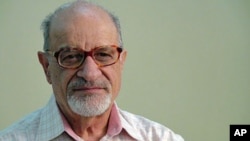Members of Syria's opposition are downplaying a rift in their ranks, but acknowledge problems within the Syrian National Council. Some of the main opposition group's more outspoken members have been talking about the ways they think are best to proceed.
|
Main Opposition Groups |
|
Much of the opposition within Syria is fragmented, struggling simply to survive against the onslaught of the Syrian army. Those abroad have for the most part coalesced under the umbrella of the Syrian National Council [SNC], led by the Paris-based academic Burhan Ghalioun. Late last month, however, several prominent SNC members appeared to split from the group over military support for the rebel Free Syrian Army.
The leader of what was dubbed the Syrian Patriotic Group, long-time human rights activist Haitham al-Maleh, said he did not abandon the SNC, but that the time has come for military action. He argues any healthy opposition has a multitude of voices.
“The opposition is not one body, one union. But we have one view for the future, so this is very important," said al-Maleh. "Inside the Syrian National Council, there is also some different ideas. In my opinion, Burhan Ghalioun doesn't want to take the hard step to support the [rebel] army by weapons. He doesn't want to play this side, maybe he is afraid. I don't know what his idea is."
Days later, despite an announcement by Ghalioun that he had formed a military council to work with the rebel army, the SNC leader's intentions remained unclear. The head of the Free Syrian Army said he was not consulted, and other factions of the armed opposition said they would continue to work independently.
Long-time political activist and SNC member Walid al-Bouni said Ghalioun's move was disingenuous.
“When you make a military council without making any discussion with other people inside the SNC. All of us, we heard this from the TV. Do you think that such kind of man is serious for support this Free Army? No, I don't think so,” said al-Bouni.
Al-Bouni believes the SNC needs a more charismatic leader, and that the group must make more of an effort to bring a broader spectrum of prominent dissidents on board. He said it's “our fault” they have not been able to enlist such figures as Michel Kilo, Aref Dalila, or Suheir Atassi.
But al-Bouni argues that internal divisions are not so profound as to justify the lack of help and recognition the SNC is getting from the international community in the fight against Syrian President Bashar al-Assad.
“They didn't act against him not because the Syrian opposition is not united. I'm not convinced that because of disunity of the Syrian opposition they didn't act until now. They didn't act because they didn't want to act,” said al-Bouni.
The United States and European nations have been strong in their condemnation of Assad, but like President Barack Obama said again Tuesday, unilateral action against him would be a mistake. With Russia and China opposed to military force, international efforts have been stymied.
The geopolitics of Syria are far more complex than that of Libya, where NATO played a decisive role. In addition, fears of what could replace the Assad government - from militant Islamists to sectarian strife - also have dampened enthusiasm for intervention.
Al-Bouni argued that not supporting the Free Syrian Army, though, all but guarantees such an outcome.
"By saying, like what the United States is saying and others, 'we will not support the Syrian [Free] Army. We will not arm it' - what we will have? We will have that every Syrian group could have some money from other place, who supports one kind of militia and after Bashar al-Assad, then will be a very big chaos,” said al-Bouni.
Advocating armed insurrection, even under the unified command of the Free Army, is not something either man takes lightly. Both al-Bouni and al-Maleh have spent decades speaking out for reform and human rights - peaceful ways to ensure human dignity - and have spent years in Syrian prisons for their efforts.
But al-Maleh sees no other choice.
“Now we have only one way: to fight, because you know, all the world, the international community, did not do anything until now for Syria," said al-Maleh. "Do we have to stay and wait for more people to be killed for nothing? We know this is the tax for free[dom], but this is a really high tax and the people of Syria want to pay."
They will not stop, he argued, and neither will the Syrian government.
| Join the conversation on our social journalism site - Middle East Voices. Follow our Middle East reports on Twitter and discuss them on our Facebook page. |




